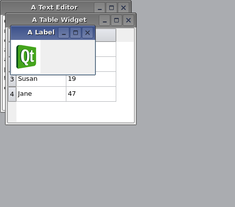| Home · All Classes · Modules |
The QWorkspace widget provides a workspace window that can be used in an MDI application. More...
Inherits QWidget.
The QWorkspace widget provides a workspace window that can be used in an MDI application.
This class is deprecated. Use QMdiArea instead.
Multiple Document Interface (MDI) applications are typically composed of a main window containing a menu bar, a toolbar, and a central QWorkspace widget. The workspace itself is used to display a number of child windows, each of which is a widget.
The workspace itself is an ordinary Qt widget. It has a standard constructor that takes a parent widget. Workspaces can be placed in any layout, but are typically given as the central widget in a QMainWindow:
MainWindow.MainWindow() { workspace = new QWorkspace; setCentralWidget(workspace); ... }
Child windows (MDI windows) are standard Qt widgets that are inserted into the workspace with addWindow(). As with top-level widgets, you can call functions such as show(), hide(), showMaximized(), and setWindowTitle() on a child window to change its appearance within the workspace. You can also provide widget flags to determine the layout of the decoration or the behavior of the widget itself.
To change or retrieve the geometry of a child window, you must operate on its parentWidget(). The parentWidget() provides access to the decorated frame that contains the child window widget. When a child window is maximised, its decorated frame is hidden. If the top-level widget contains a menu bar, it will display the maximised window's operations menu to the left of the menu entries, and the window's controls to the right.
A child window becomes active when it gets the keyboard focus, or when setFocus() is called. The user can activate a window by moving focus in the usual ways, for example by clicking a window or by pressing Tab. The workspace emits a signal windowActivated() when the active window changes, and the function activeWindow() returns a pointer to the active child window, or 0 if no window is active.
The convenience function windowList() returns a list of all child windows. This information could be used in a popup menu containing a list of windows, for example. This feature is also available as part of the Window Menu Solution.
QWorkspace provides two built-in layout strategies for child windows: cascade() and tile(). Both are slots so you can easily connect menu entries to them.
 |
 |
If you want your users to be able to work with child windows larger than the visible workspace area, set the scrollBarsEnabled property to true.
Specifies the order in which child windows are returned from windowList().
| Constant | Value | Description |
|---|---|---|
| QWorkspace.CreationOrder | 0 | The windows are returned in the order of their creation |
| QWorkspace.StackingOrder | 1 | The windows are returned in the order of their stacking |
The parent argument, if not None, causes self to be owned by Qt instead of PyQt.
Constructs a workspace with the given parent.
This method is also a Qt slot with the C++ signature void activateNextWindow().
Gives the input focus to the next window in the list of child windows.
See also activatePreviousWindow().
This method is also a Qt slot with the C++ signature void activatePreviousWindow().
Gives the input focus to the previous window in the list of child windows.
See also activateNextWindow().
Returns a pointer to the widget corresponding to the active child window, or 0 if no window is active.
See also setActiveWindow().
The w argument has it's ownership transferred to Qt.
Adds widget w as new sub window to the workspace. If flags are non-zero, they will override the flags set on the widget.
Returns the widget used for the window frame.
To remove the widget w from the workspace, simply call setParent() with the new parent (or 0 to make it a stand-alone window).
This method is also a Qt slot with the C++ signature void arrangeIcons().
Arranges all iconified windows at the bottom of the workspace.
See also cascade() and tile().
This method is also a Qt slot with the C++ signature void cascade().
Arranges all the child windows in a cascade pattern.
See also tile() and arrangeIcons().
Reimplemented from QWidget.changeEvent().
Reimplemented from QObject.childEvent().
This method is also a Qt slot with the C++ signature void closeActiveWindow().
Closes the child window that is currently active.
See also closeAllWindows().
This method is also a Qt slot with the C++ signature void closeAllWindows().
Closes all child windows.
If any child window fails to accept the close event, the remaining windows will remain open.
See also closeActiveWindow().
Reimplemented from QObject.event().
Reimplemented from QObject.eventFilter().
Reimplemented from QWidget.hideEvent().
Reimplemented from QWidget.paintEvent().
Reimplemented from QWidget.resizeEvent().
This method is also a Qt slot with the C++ signature void setActiveWindow(QWidget*).
Makes the child window that contains w the active child window.
See also activeWindow().
Reimplemented from QWidget.showEvent().
Reimplemented from QWidget.sizeHint().
This method is also a Qt slot with the C++ signature void tile().
Arranges all child windows in a tile pattern.
See also cascade() and arrangeIcons().
Reimplemented from QWidget.wheelEvent().
Returns a list of all visible or minimized child windows. If order is CreationOrder (the default), the windows are listed in the order in which they were inserted into the workspace. If order is StackingOrder, the windows are listed in their stacking order, with the topmost window as the last item in the list.
This is the default overload of this signal.
This signal is emitted when the child window w becomes active. Note that w can be 0, and that more than one signal may be emitted for a single activation event.
See also activeWindow() and windowList().
| PyQt 4.11.4 for X11 | Copyright © Riverbank Computing Ltd and The Qt Company 2015 | Qt 4.8.7 |